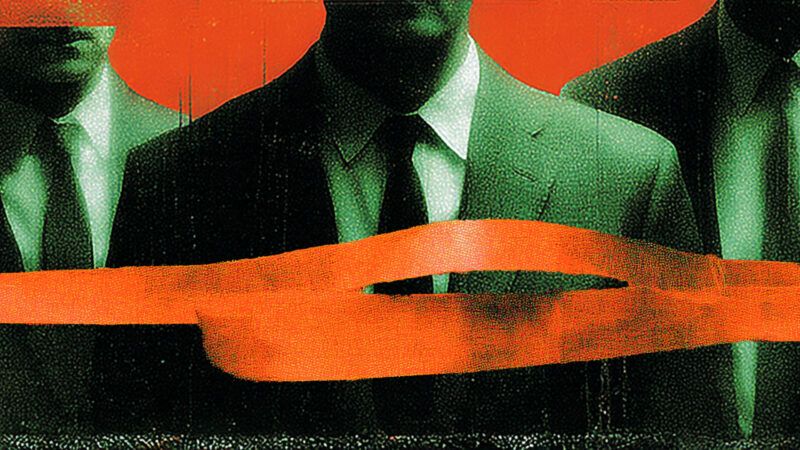Licensing Boards Are Legalized Cartels
Industry insiders dominate the boards that control who can work, using government power to shut out competitors, protect profits, and block reform.

Occupational licensing laws—those mandates that workers in hundreds of professions obtain a license before earning a living—lock people out of jobs while failing to make services any better. The problem isn't just the laws, though; it's the cartels running them. Industry-controlled licensing boards operate less like neutral public watchdogs and more like gatekeepers protecting their turf.
More than 75 percent of licensing boards in the U.S. have rulemaking authority, allowing them to interpret licensing statutes, set fees, design and grade licensing exams, and investigate or penalize practitioners, sometimes imposing civil or criminal charges. Of the roughly 1,700 boards nationwide, about 85 percent reserve most seats for active license holders; some even include owners of training schools that profit from license requirements. State governors are technically responsible for appointing board members, but in 23 states they must choose from lists supplied by industry associations. That ensures that reform-minded candidates rarely make it past the gatekeepers.
The boards aren't bashful about exercising their power to protect people from competition. Records of enforcement actions confirm this: Boards frequently pursue unlicensed entrepreneurs—sometimes through sting operations designed to shake down businesses and contractors to ensure they have the right paperwork—while ignoring actual threats to public safety.
One notorious example is the North Carolina State Board of Dental Examiners, which was at the center of a U.S. Supreme Court case 10 years ago. Beginning in 2003, the North Carolina board waged a campaign against non-dentist teeth-whitening providers, sending dozens of cease-and-desist letters and pressuring mall owners to evict the vendors.
In the board's view, the whiteners were practicing dentistry without a license, even though they were simply providing assistance to customers who could have done the same thing at home. Not surprisingly, most people on the board were active dentists who offered the same services at a steeper cost. Because the group was stacked that way, the Supreme Court ruled in 2015 that it was acting anti-competitively and didn't warrant the same protections that normal government enforcement agencies are entitled to.
The ruling should have prompted nationwide reforms. Instead, most states have allowed insiders to keep board control. Georgia, Michigan, and North Dakota actually increased the number of dentists on their state dental boards.
The obvious solution is to eliminate the licensing laws that give the government power—delegated to boards or otherwise—to block workers and entrepreneurs from the labor force. This has proven difficult when tried, and at best it has resulted in eliminating a requirement for a select occupation or two. The biggest opponents, unsurprisingly, are the boards themselves, some of which use the fees paid by the licensing applicants to pay lobbyists to defeat reforms.
So here is an alternative approach: Eliminate licensing boards. Enforcement of existing licensing laws could be returned to attorneys general or health departments, which are subject to traditional oversight and to constitutional checks and balances.
Any boards that remain should be limited to advisory or administrative purposes, such as grading exams or processing applications. Ensuring that industry members make up no more than half of all board seats would also be a positive step, as would eliminating industry vetoes over board appointments.
Such changes could incrementally decrease the costs imposed by aggressive, arbitrary, and self-serving enforcement. And they could be steps to a more fundamental reform: the elimination of the underlying licensing laws.
Editor's Note: As of February 29, 2024, commenting privileges on reason.com posts are limited to Reason Plus subscribers. Past commenters are grandfathered in for a temporary period. Subscribe here to preserve your ability to comment. Your Reason Plus subscription also gives you an ad-free version of reason.com, along with full access to the digital edition and archives of Reason magazine. We request that comments be civil and on-topic. We do not moderate or assume any responsibility for comments, which are owned by the readers who post them. Comments do not represent the views of reason.com or Reason Foundation. We reserve the right to delete any comment and ban commenters for any reason at any time. Comments may only be edited within 5 minutes of posting. Report abuses.
Please to post comments


Support caveat emptor. I imagine there would be third party certification groups that would look like licensing boards. At least for things that customers would want like say someone performing eye surgery or designing a bridge. Not sure licensing is needed for a person doing your nails or cleaning the gutters.
So... Pimps shouldn't have to register with the government?
Oh, in other news:
Bob Ross paintings to be auctioned to support public TV stations after federal funding cuts
So which is it, has Trump literally not cut anything worth mentioning or have the cuts been so deep that America is on the brink of extinction?
Think they are trying to titanium whitewash what is happening.
And here I thought it was made possible by viewers like me.
Executive bonuses paid for by suckers like you!
But he got a tote bag that cost $1 to make in an Asian child labor sweat shop.
WFMU's donors have responded to the 8% cut in revenues occasioned by the end of the community service grant by just boosting donations. Their already scheduled October fundraiser is 40% of the way to goal, and it's only Oct. 7.
Meanwhile I'm wondering how to get donations going to my research fund &mdash: https://www.gofundme.com/f/the-institute-for-health-research-action-project I need Congress to cut me off so I get pity donations!
If you have to get permission from the government to earn a living, neither you nor the market are free. Period. Full stop.
Quack "doctor" wannabes will love this.